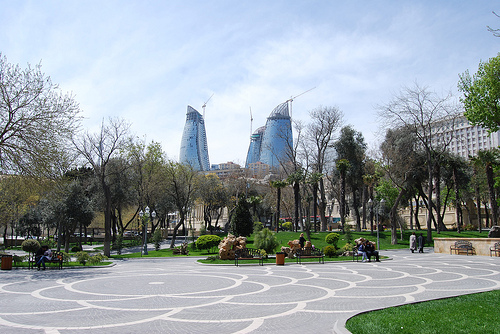
Baku is a city intent on reinventing itself block by steady block. Apartment high-rises and office buildings from the Soviet ‘70s — pock-marked and stained gray by pollution — are transformed in white stone at a frightening pace. Baku today reminds me more of Vienna or Zagreb than a former Soviet republic that clings to the edge of the Caspian Sea.
For my six journalism students the changes wrought in their city seemed a mixed blessing. They are caught up in the excitement of Baku’s unremitting facelift and quietly proud when I admired its three-pronged, “flame towers” buildings, an architectural overreach whose apartments are filled with wealthy Iranians. My students, Azerbaijani men and women in their mid-twenties, also worried about the future of a place they sometimes found hard to recognize.
It is oil money that fuels Baku’s growth and creates its surprising riches. The city struts, its newfound wealth evident on streets crowded with BMWs, Lexus SUVs and London-style taxis with working meters, painted in the president’s favorite color, purple. The city center rings with the noise of honking horns, as if constant clatter is needed to certify ambition fueled by corruption and new money. On my walk to work down Nakhichivani Streettrapped drivers lean on horns for fifteen seconds at a time. That may not sound long; try it, listen to it, multiply it by dozens of cars captured in daily gridlock along narrow streets lined by sixteen story apartment blocs.
As with most new places, an abundance of caution is needed to cross streets until the unwritten laws of traffic and pedestrian rights become clear: Drivers rule. It took about ten days of teaching before I realized that the chaos of Baku’s streets had decamped to my classroom.
We had listened to each other speak English for a while and our accents began to make sense; the uncommon pronunciation became ordinary, the syntax mentally transposed when necessary. But when I asked a question of one student, two others would answer, vying for attention. Arguments broke out, followed by scolding from the women.
People compulsively checked Facebook on laptops and thumbed emails on their phones. It took another week before I convinced them that I needed to hear what each person had to say and that it was not truly possible to understand me while typing.
I made them put their computers and phones on a table at the end of the room, which annoyed people exceedingly, even as we came to accept each other’s limitations. I was demanding in ways that were unknowable to students who grew up in an educational system that still allowed the buying and selling of course grades and school advancement.
They said they were journalists, but none were yet reporters. I required them to check, not surmise. I told them taking accurate notes was a requirement, not a suggestion. One insisted he could remember what people said and did not need to record words or write them down. They initially balked at rewrites; they knew how to do it, they said. Not yet, I replied. You know in your head; that’s not enough. Show me: old school. Them: bewilderment.
At mock press conferences they asked me vague questions that had little point but reflected what they saw on television: “Could you comment on….” They paid no attention to detail large or small. That changed. Not perfectly, not completely. But it changed. Somewhere along the line they stopped calling me by my first name and started calling me “professor” or “Mr. Kenny,” though I never asked them to call me anything. On the street they introduced me to the people they were interviewing as “our professor from America.”
They were good at talking to strangers, not put off by the annoyed or the irritated who refused to talk, of which there are many in “man-on-the-street” interviews.
My students have left Baku for Tbilisi, where they will study further and hope to earn master’s degrees from the Georgia Institute of Public Affairs. Their lives have a chance to be forever altered. I’m not sure how many will return to Baku to work in journalism. Self-censorship reigns in Azerbaijan and probing questions are discouraged; the government takes retribution against journalists who ignore the rules. People know better, but there is little they can do about it. During a month in Baku I found no Western-produced newspapers, but President Ilhem Aliev is building apartment blocs that house only journalists and their families.
My Azerbaijani students, who are still learning English, may not yet fully understand the meaning of the phrase, the “soft bigotry of low expectations.” Someday they will, I am sure. Perhaps they will also understand that they were good enough to be corrected, even at the beginning.
Timothy Kenny is a former newspaper foreign editor, non-profit foundation executive, Fulbright scholar, and college journalism professor.
Photo by Flickr Creative Commons user Dieter Ziernig




